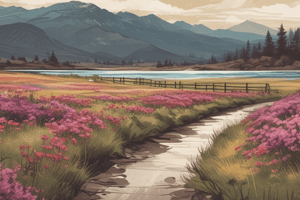Podcast
Questions and Answers
What type of igneous rock forms when magma erupts onto the earth's surface and cools quickly?
What type of igneous rock forms when magma erupts onto the earth's surface and cools quickly?
- Gabbro
- Basalt (correct)
- Pumice (correct)
- Granite
Which of the following characteristics define intrusive igneous rocks?
Which of the following characteristics define intrusive igneous rocks?
- They form from magma pushing into surrounding rock. (correct)
- They have a glassy texture due to rapid cooling.
- They cool rapidly and have few crystals.
- They are formed from lava on the earth's surface.
Which igneous rock is primarily used for abrasive cleaning products due to its light weight and bubble structure?
Which igneous rock is primarily used for abrasive cleaning products due to its light weight and bubble structure?
- Basalt
- Granite
- Pumice (correct)
- Scoria
Which statement about basalt is correct?
Which statement about basalt is correct?
What process can lead to the formation of magma?
What process can lead to the formation of magma?
What is the main process through which sedimentary rocks are formed?
What is the main process through which sedimentary rocks are formed?
Which type of rock is formed under conditions of high temperature and pressure?
Which type of rock is formed under conditions of high temperature and pressure?
Which characteristic is NOT associated with sedimentary rocks?
Which characteristic is NOT associated with sedimentary rocks?
What property of sandstone makes it unsuitable for building construction when weathered?
What property of sandstone makes it unsuitable for building construction when weathered?
Which sedimentary rock is commonly used in the construction of heavy structures?
Which sedimentary rock is commonly used in the construction of heavy structures?
What is the term for the layers of rock in sedimentary rock formation?
What is the term for the layers of rock in sedimentary rock formation?
Which of the following is a primary use of marble?
Which of the following is a primary use of marble?
What composition is laterite primarily made of?
What composition is laterite primarily made of?
Flashcards are hidden until you start studying
Study Notes
What are Rocks?
- Rocks are naturally occurring solid mixtures composed of one or more minerals, or organic matter.
- They are classified by how they are formed, their composition, and texture.
- Rocks change over time through the rock cycle.
Igneous Rocks
- Igneous rocks begin as magma, a mixture of many minerals.
- Magma can form when rock is heated, when pressure is released, or when rock changes composition.
- Magma freezes between 700 °C and 1,250 °C.
Intrusive Igneous Rocks
- Intrusive igneous rocks (Plutonic) form when magma pushes into surrounding rock below the Earth's surface.
- E.g., gabbro
Extrusive Igneous Rocks
- Extrusive rocks (Lava or volcanic) form when magma erupts onto the Earth's surface (lava) and cools quickly.
- This rapid cooling results in very small or no crystals being formed.
- E.g. Granite, basalt, scoria, pumice
Uses of Igneous Rocks
- Granite is a hard igneous rock used for buildings and houses, especially in kitchens and bathrooms. It is also used as ballast for railways.
- Pumice is a light igneous rock with thousands of tiny bubbles. It is used to remove dead skin and in abrasive cleaning products.
- Basalt is a dark-colored, fine-grained igneous rock prevalent in the oceanic crust. It is rich in iron and is used as an ingredient in concrete. Basalt is also commonly used in road construction and masonry works.
Sedimentary Rocks
- Sedimentary rock is formed by erosion, which moves sediments from one place to another.
- Sediments are deposited in layers, with older layers on the bottom.
- The layers become compacted and cemented together.
- Sedimentary rocks are formed at or near the Earth's surface.
- No heat or pressure is involved in their formation.
- Strata refers to layers of rock.
- Stratification is the process in which sedimentary rocks are arranged in layers.
Examples of Sedimentary Rocks
- Sandstone is used in the construction of heavy structures and is found in different colors such as white, grey, red, buff, brown, yellow, and dark grey. Weathering sandstone makes it unsuitable for building construction.
- Laterite is composed of iron and aluminum oxides.
- Limestone is a common sedimentary rock.
Metamorphic Rock
- Metamorphic rocks are rocks that change shape.
- This transformation occurs due to changes in temperature and pressure, while remaining solid.
- Metamorphosis usually takes place deep in the Earth.
Examples of Metamorphic Rocks
- Slate shows great variation in its building properties, depending on the thickness of the sheets and the color of the rock. It is used as roofing tiles, slabs, and pavements.
- Marble is used for facing and ornamental works, such as columns, flooring, and steps. Marble stones are strong, uniform in texture, least porous, and take an excellent polish. It can be easily cut and carved into different shapes. Marble is available in different colors like white and pink.
Studying That Suits You
Use AI to generate personalized quizzes and flashcards to suit your learning preferences.




